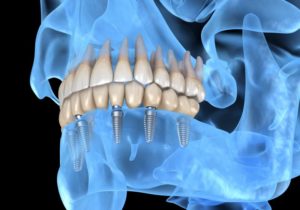
Dental implants in Lebanon serve as prosthetic tooth roots. Because of that, some people assume that just like natural teeth each have their own root, each implant-supported tooth also needs its own implant to support it. However, that is not true. In this blog post, we will discuss how many implants you may need to once again enjoy all the benefits of a complete, gap-free smile.
One Dental Implant
If you are missing just one tooth, you will receive a single dental implant, and a custom crown will go on top of it. If you are missing two teeth in a row, you may still need just one implant. It will support a crown, and the crown will be attached to a pontic (an artificial tooth). You can think of this as sort of a “two for one” deal.
Two Dental Implants
If you are missing three or more teeth in a row, your dentist will likely recommend that you receive an implant-supported bridge. One implant will be placed at each end of the empty space, and they will each support a crown. The crowns can support as many as three pontics between them.
It is also possible for two dental implants, placed at the front of the mouth, to support an entire removable denture in the lower jaw. While dentists usually do not recommend this because such a denture may be a bit unstable, it is an option for many patients who are on a budget.
Four or More Dental Implants
If you have lost all or most of your teeth throughout one of your arches, you might be a candidate for All-on-4 in Lebanon. As the name of the treatment implies, it involves the use of just four dental implants to support an entire arch of replacement teeth. Traditional full-arch replacement systems require more than four dental implants. They may need as many as six or more to provide support for an entire row of teeth, especially in cases where the upper teeth are being replaced.
If you require full mouth replacement — that is, you have no natural teeth remaining in either the upper or lower arch— you may require a total of 10 – 14 implants.
Your Custom Treatment Plan
As you can see from the above information, dental implants are a versatile treatment. The only way to know for sure how many of them you will need is to consult with a qualified implant dentist. After they assess your oral health, they will design a customized treatment plan with the goal of helping you enjoy optimum results in the most conservative way possible.
Are you ready to replace your lost teeth? Just a few dental implants may be able to help you recomplete your smile!
Meet the Practice
Dental implants in Lebanon serve as prosthetic tooth roots. Because of that, some people assume that just like natural teeth each have their own root, each implant-supported tooth also needs its own implant to support it. However, that is not true. In this blog post, we will discuss how many implants you may need to once again enjoy all the benefits of a complete, gap-free smile.
